SCIENTIFIC
REALISM
SCIENTIFIC
Selected Essays of
MARIO BUNGE
SCIENTIFIC
MARTIN MAHNER



CONTENTS
1. METAPHYSICS
II. METHODOLOGY AND PHILOSOPHY OF SCIENCE
III. PHILOSOPHY OF MATHEMATICS
IV. PHILOSOPHY OF PHYSICS
V. PHILOSOPHY OF PSYCHOLOGY
VI. PHILOSOPHY OF SOCIAL SCIENCE
VII. PHILOSOPHY OF TECHNOLOGY
VIII. MORAL PHILOSOPHY
IX. SOCIAL AND POLITICAL PHILOSOPHY
PREFACE

 n September 21, 1999, the physicist and philosopher Mario Bunge celebrated his eightieth birthday. I take this opportunity to edit-instead of a traditional Festschrift such as those previously edited by Agassi and Cohen (1982) as well as Weingartner and Dorn (1990)-a selection of his papers. These papers have been selected so as to give a panorama of the philosophical system that Bunge has developed over the past fifty years, and published in about thirty-five books, not to mention reprints and translations, as well as uncounted articles. The most important part of Bunge's oeuvre is his monumental eight-volume Treatise on Basic Philosophy (1974-1989). In this work Bunge treats semantics, ontology, epistemology, philosophy of science, and ethics from a unified and unique perspective. In other words, he presents these topics as parts of a philosophical system. This system is anchored in scientific realism and materialism, and is thus an instance of what is also known as philosophical naturalism (see the introduction).
n September 21, 1999, the physicist and philosopher Mario Bunge celebrated his eightieth birthday. I take this opportunity to edit-instead of a traditional Festschrift such as those previously edited by Agassi and Cohen (1982) as well as Weingartner and Dorn (1990)-a selection of his papers. These papers have been selected so as to give a panorama of the philosophical system that Bunge has developed over the past fifty years, and published in about thirty-five books, not to mention reprints and translations, as well as uncounted articles. The most important part of Bunge's oeuvre is his monumental eight-volume Treatise on Basic Philosophy (1974-1989). In this work Bunge treats semantics, ontology, epistemology, philosophy of science, and ethics from a unified and unique perspective. In other words, he presents these topics as parts of a philosophical system. This system is anchored in scientific realism and materialism, and is thus an instance of what is also known as philosophical naturalism (see the introduction).
Now, not everyone has the time or the interest or the patience to work their way through an eight-volume treatise, let alone twenty-five further books-at least not unless they have a rough idea of what to expect and gain from so doing. Also, the junior undergraduate student of science or philosophy may not yet have the resources to do so, even if principally interested in this philosophy. Finally, it is practically impossible to cover eight volumes in class, unless one is prepared to spend several semesters on a single philosophical system. For all these reasons, this collection, containing thirty articles which illustrate most aspects of his philosophy, from metaphysics to philosophy of science to moral and social philosophy, provide a useful entry to Bunge's philosophical system. Such a collection can be managed in a reasonable time, not only by individuals but also in class. Equally, for courses not specifically directed to Bunge's philosophy, a teacher may use the book as a philosophically coherent source of interesting papers on a variety of topics, such as for class presentations by students, in the context of a larger discussion.
The papers in this selection were written between 1954 and 1999. Some of them are original contributions to this collection. That is, this selection has something to offer not only the beginner, but also those who are already familiar with Bunge's work. The papers are unequal in both length and complexity. Whereas some should be accessible to everyone, some of them make use of some elementary formal tools, such as mathematical logic and set theory. However, even the reader not familiar with such formal tools should be able to follow most of those articles. In any case, he or she need not be scared by a few formulas here and there.
Many of the papers have been edited or even revised to a greater or lesser extent, either by the editor or by Mario Bunge himself. In particular, I have eliminated some redundancies as well as some inessential formalizations, and prepared a master bibliography. However, it was impossible to remove all redundancies, because some papers would otherwise be badly distorted, and some concepts need to be explained and discussed whenever required by the context. After all, it should also be possible to read only a single or a couple of papers in isolation, rather than the entire anthology.
Finally, I wish Mario Bunge many more years of fruitful and productive work to come.
Martin Mahner
December 1999/April 2001
ACKNOWLEDGMENTS
 ost papers in this collection are reprinted ,from the books and journals, respectively, listed in the following. I am very grateful to the publishers for having kindly granted reprint permissions. Articles not listed here are original contributions to this collection.
ost papers in this collection are reprinted ,from the books and journals, respectively, listed in the following. I am very grateful to the publishers for having kindly granted reprint permissions. Articles not listed here are original contributions to this collection.
"How Do Realism, Materialism, and Dialectics Fare in Contemporary Science?" In M. Bunge (1973) Method, Model, and Matter, pp. 169-85. Dordrecht: D. Reidel ( Kluwer Academic Publishers, Dordrecht)
"New Dialogues Between Hylas and Philonous." Philosophy and Phenomenological Research 15 (1954): 192-99. ((D Philosophy and Phenomenological Research, Brown University, Providence, R.I.)
"Energy: Between Physics and Metaphysics." Science & Education 9 (2000): 457-61. ( Kluwer Academic Publishers, Dordrecht)
"The Revival of Causality." In G. Floistad (ed.) (1982) Contemporary Philosophy. A New Survey, vol. 2, pp. 133-55. The Hague: Martinus Nijhoff ( Kluwer Academic Publishers, Dordrecht)
"Emergence and the Mind." Neuroscience 2 (1977): 501-509. ( Elsevier Science, Oxford)
"The Status of Concepts." In M. Bunge (1981) Scientific Materialism, pp. 161-74. Dordrecht: D. Reidel ( Kluwer Academic Publishers)
"Popper's Unworldy World 3." In M. Bunge (1981) Scientific Materialism, pp. 137-57. Dordrecht: D. Reidel ( Kluwer Academic Publishers, Dordrecht)
"On Method in the Philosophy of Science." In M. Bunge (1973) Method, Model, and Matter, pp. 1-23. Dordrecht: D. Reidel ( Kluwer Academic Publishers, Dordrecht)
"Induction in Science." In M. Bunge (1963) The Myth of Simplicity, pp. 137-52. Englewood Cliffs, N.J.: Prentice-Hall ( M. Bunge)
"The GST Challenge to the Classical Philosophies of Science." International Journal of General Sytems 4 (1977): 29-37. ((D Gordon & Breach Science Publishers, Lausanne)

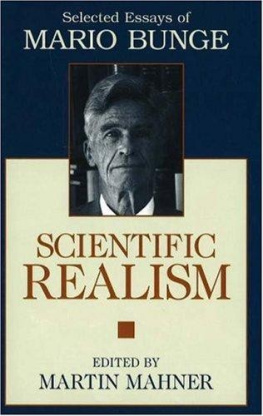
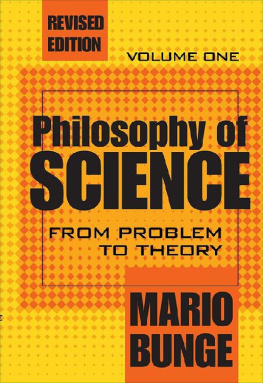
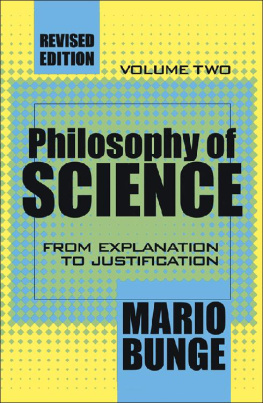

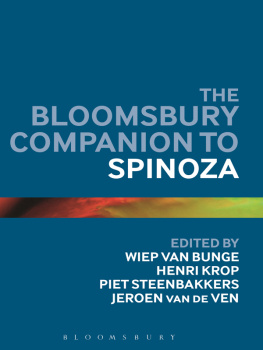
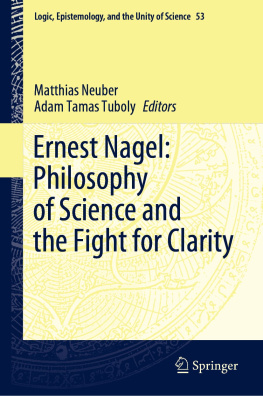
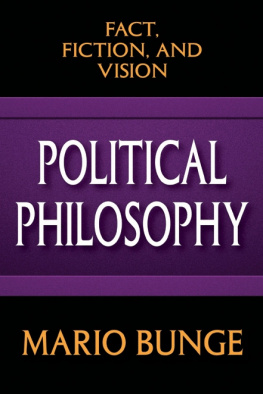







 n September 21, 1999, the physicist and philosopher Mario Bunge celebrated his eightieth birthday. I take this opportunity to edit-instead of a traditional Festschrift such as those previously edited by Agassi and Cohen (1982) as well as Weingartner and Dorn (1990)-a selection of his papers. These papers have been selected so as to give a panorama of the philosophical system that Bunge has developed over the past fifty years, and published in about thirty-five books, not to mention reprints and translations, as well as uncounted articles. The most important part of Bunge's oeuvre is his monumental eight-volume Treatise on Basic Philosophy (1974-1989). In this work Bunge treats semantics, ontology, epistemology, philosophy of science, and ethics from a unified and unique perspective. In other words, he presents these topics as parts of a philosophical system. This system is anchored in scientific realism and materialism, and is thus an instance of what is also known as philosophical naturalism (see the introduction).
n September 21, 1999, the physicist and philosopher Mario Bunge celebrated his eightieth birthday. I take this opportunity to edit-instead of a traditional Festschrift such as those previously edited by Agassi and Cohen (1982) as well as Weingartner and Dorn (1990)-a selection of his papers. These papers have been selected so as to give a panorama of the philosophical system that Bunge has developed over the past fifty years, and published in about thirty-five books, not to mention reprints and translations, as well as uncounted articles. The most important part of Bunge's oeuvre is his monumental eight-volume Treatise on Basic Philosophy (1974-1989). In this work Bunge treats semantics, ontology, epistemology, philosophy of science, and ethics from a unified and unique perspective. In other words, he presents these topics as parts of a philosophical system. This system is anchored in scientific realism and materialism, and is thus an instance of what is also known as philosophical naturalism (see the introduction).
 ost papers in this collection are reprinted ,from the books and journals, respectively, listed in the following. I am very grateful to the publishers for having kindly granted reprint permissions. Articles not listed here are original contributions to this collection.
ost papers in this collection are reprinted ,from the books and journals, respectively, listed in the following. I am very grateful to the publishers for having kindly granted reprint permissions. Articles not listed here are original contributions to this collection.